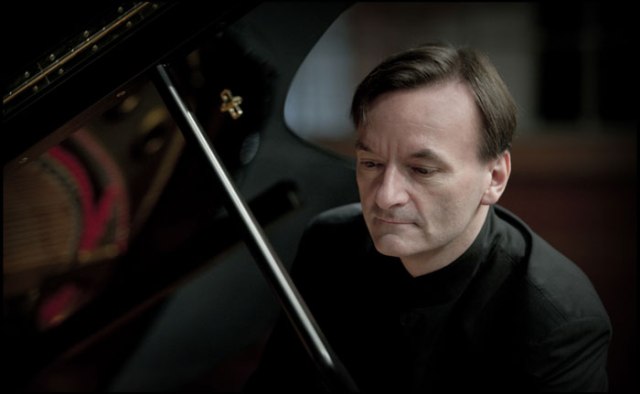Stephen Hough, piano
Imani Winds
Stanley H. Kaplan Penthouse
Lincoln Center
New York, NY
August 10, 2018
Debussy: Clair de lune from Suite bergamasque
Mozart: Quintet in E-flat major for Piano and Winds, K452
Poulenc: Sextet for Piano and Wind Quintet, FP 100
Encore:
Poulenc, arr. Hough: No. 1 from Trois mouvements perpétuels, FP 14
Right on the heels of the Mostly Mozart Festival Orchestra’s concluding performance of the summer season, one had a late-night opportunity to see pianist Stephen Hough in a much more intimate setting: a remarkable chamber music performance with the Imani Winds at the Stanley H. Kaplan Penthouse, part of the festival’s A Little Night Music series. Hough opened the program sans winds in a luminous, shimmering account of Debussy’s Clair de lune. Debussy is a composer to whom Hough has recently turned ample attention, releasing a very fine all-Debussy album at the beginning of the year (although one would need to look to his French Album for a recording of the present work). The acoustics in the Penthouse were a bit dry, but the striking setting of flickering candlelight and the Manhattan skyline made it a small price to pay, an atmospheric complement to the rapturous beauty of Hough’s pianism.

The remainder of the brief program was devoted to sterling examples of chamber works for piano and winds by Mozart and Poulenc. Hough noted that these disparate composers had little in common musically save for their wry sense of humor. A stately introduction opened the former’s Quintet (K452), giving way to a jaunty primary theme which beautifully melded Hough’s elegant keyboard playing with the graceful winds – a harmonious blend of diverse timbres. The Larghetto was sweet and dulcet in its delicate trills and ornaments, and an almost sinfully sumptuous melody was passed through the winds. The finale was a jovial affair yet in no apparent hurry with a lyrical subject at its core.
Poulenc’s Sextet, dating from the early 1930s, added the flute to the forces onstage. The commanding opening brought to life a scene bustling with coloristic contrasts and manic syncopations evoking American ragtime. A searching monologue in the bassoon (Monica Ellis) and impressionistic writing from the piano offered some introspection, only for the movement to conclude in a dramatic flourish. An underlying melancholy – perhaps another parallel to Mozart – was palpable in the central divertissement with some especially fine playing from oboist Toyin Spellman-Diaz. More frenzied contrast was manifest in due course, with a rambunctious and perky finale leading inexorably to a bright and brilliant end.
A lone encore continued the ensemble’s exploration of Poulenc, namely Hough’s own transcription for the sextet of the first of the Mouvements perpétuels (originally a work for solo piano). Hough was certainly apt in remarking it had “not a bit of angst”, and the seamless performance closed the evening in pure delight.

